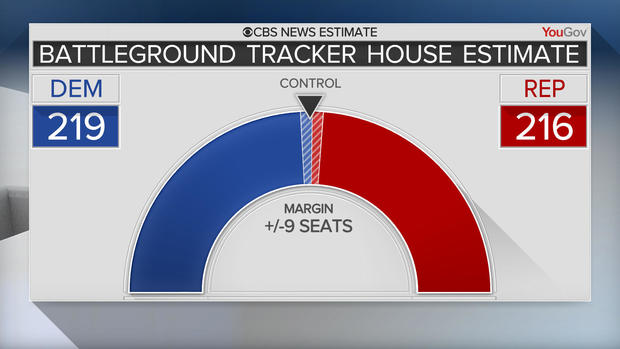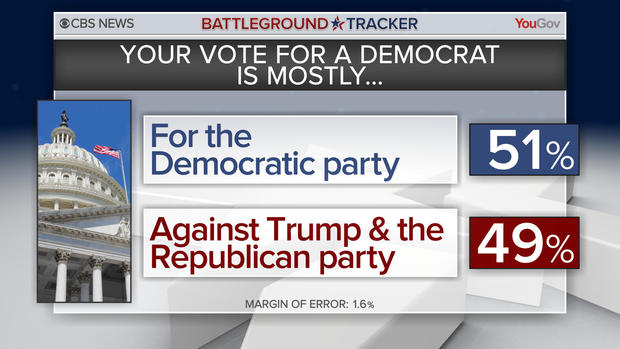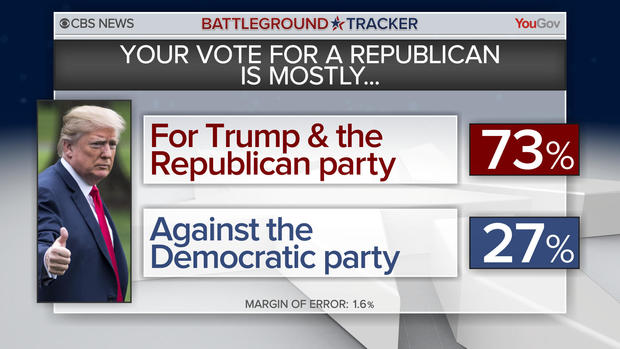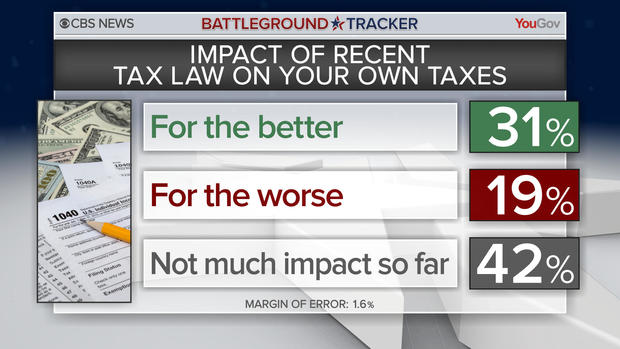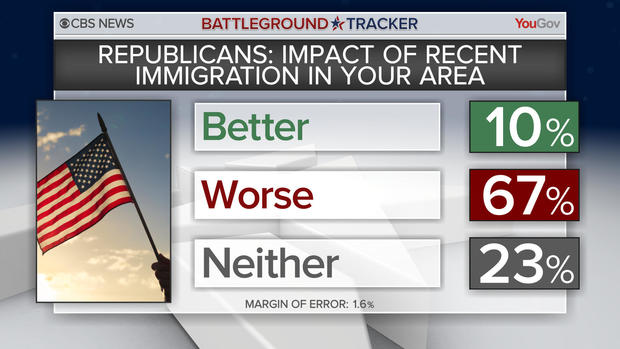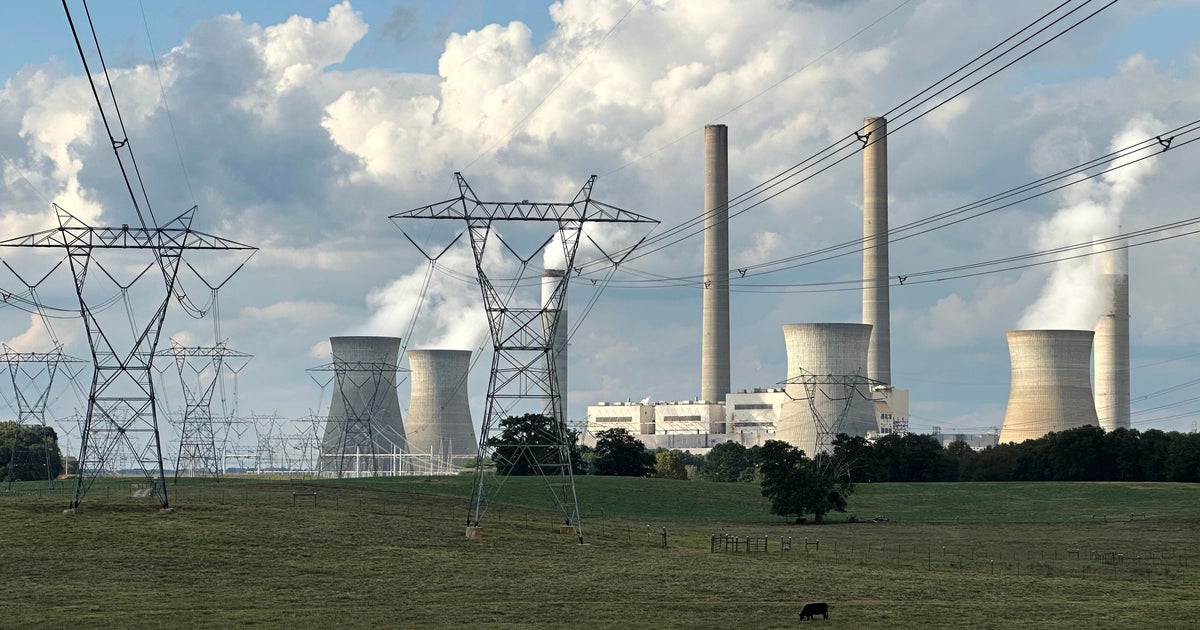CBS News Battleground Tracker: The House is a toss-up
By Anthony Salvanto, Jennifer De Pinto, Kabir Khanna and Fred Backus
Democrats 219, Republicans 216 in tight contest for control
In the race for Congress, most polls report one national percentage for Democrats and Republicans. But that's not very helpful – because this is a race for seats. 435 of them, in fact.
So the CBS News/YouGov Battleground Tracker will report seats: how many districts the Democrats would get, and how many the Republicans would get, as of today. And we find the 2018 campaign looks like a toss-up contest for control at the moment, as the Democrats would most likely get 219 seats if the election were today (just one more than the 218 needed for a majority) and the Republicans 216. With a margin of error of nine seats on the model, control is totally up for grabs.
This would amount to a sizable gain for Democrats, who currently hold 195 seats (including vacant seats) – yet it just barely puts them in position to take control, given the deficit they have to make up. But it's not yet the massive "blue wave" that some pundits have speculated will sweep the Democrats to a comfortable majority, despite their high-profile wins and strong turnout in recent special elections.
There are a record number of women running, and that brings partisan splits: Republicans say it does not matter whether a candidate is a man or a woman, and those few who have a preference marginally prefer male candidates. Democrats are more likely to have a preference, and it's for the woman among those who do, by a nine-to-one ratio. Democratic women, in particular, very much would prefer a woman candidate, saying that women would have a better understanding of the issues they care about.
We do all this based on a new, large-scale survey of voters across the country, concentrated in the competitive House districts, and then modeled using those voters' preferences, as well as district-level factors and demographics in all 435 districts. We'll track this as it changes – and as the competitive district list itself changes – throughout the year.
The shape of the race
With five months to go until Election Day, a majority of voters in battleground districts say their midterm vote this year matters just as much as in a presidential election. But Democrats (28 percent) are twice as likely as Republicans (14 percent) to say their midterm vote is more important than in a presidential election.
The Democrats' fortunes do seem to hinge on dissatisfaction with the administration – half of their voters say they are voting against the Republicans rather than for the Democrats – and on less-reliable voters who don't typically vote in midterms, including some who didn't vote at in 2016 – but who tell us that they will now.
On the other hand, most backing a Republican candidate say they're doing so to support the party and the president's policies, not to oppose the Democrats.
Republicans hold a few advantages of their own and start off in position to still hang on to their majority, if a slimmer one. Voters say their local economies are good. Republican voters say they'll vote – and they have before. President Trump's voters are still with him and the party. They don't all approve of how he handles himself personally, but they do like that he's shaking up the establishment, and while some are unsure what they'll do, they aren't considering Democrats.
Still, many voters in these battleground districts say they have yet to feel the impact of some Trump administration and GOP policies such as changes to the health care law and trade policies. More than four in 10 say they haven't felt any impact from the recent tax law, but among those who have, they say it's been more positive than negative, particularly Republicans.
While most Republicans overall like Mr. Trump and his policies, most voters in these battleground districts dislike the way the president handles himself personally (62 percent), and a smaller majority dislike his policies overall (51 percents).
Democrats are benefitting from a significant gender gap: by double-digits, women plan to back the Democratic candidate over the Republican, while Republicans lead among men by five points. There is a divide by education as well. White voters without a college degree were some of Mr. Trump's strongest backers and say they are backing Republicans for Congress, while Democrats lead with white college graduates.
While Democrats may poised to make gains, more than half of voters don't think either party in Congress has been trying to address the things they care about. Partisans think their own party is trying at least some to address their concerns, but few partisans think they are doing a lot on that. Right now, the GOP has a slight edge with independents, some of whom like the president's policies -- but not the way he handles himself personally. About a quarter of them aren't sure who'll they vote for.
Issues: What do voters want to hear?
Overall, voters in these competitive districts want to hear a lot from congressional candidates on health care, jobs and wages, and immigration.
Democrats and Republicans have different priorities. Most Republicans want to hear a lot about immigration, followed by jobs and wages, and health care. Nearly two-thirds of Republicans say the arrival of new immigrants has changed the area where they live, and most say it's for the worse.
For Democrats, they want candidates to focus on health care a lot, as well as income inequality, education and teacher salaries, and jobs. They are more likely than Republicans to say unemployment and the availability of good jobs is a problem where they live.
Four in 10 Democrats want to hear a lot from candidates about the Russia investigation, ranking it lower in priority than these other issues. Only 9 percent of Republicans want candidates to talk a lot about that issue.
Because this poll dives into local areas and districts, we asked voters how things are in their area – and Democrats and Republicans both report opioids and gas prices are concerns in their locales. Few in either party see gangs as a big problem where they live. They differ some on jobs: more Democrats than Republicans see unemployment and the availability of good jobs as a problem. While Republicans see a better jobs situation, they say that the arrival of new immigrants is changing their local area, and in their view, for the worse.
The House estimate is based on a multilevel regression and post-stratification model incorporating voter responses to this survey and has a margin of error of +/- 9 seats. The CBS News 2018 Battleground Tracker is a panel study based on interviews conducted of a representative sample of registered voters in 64 competitive and likely competitive congressional districts in the United States fielded between May 24–30, 2018 with 5,693 respondents. The margin of error +/- 1.6.
